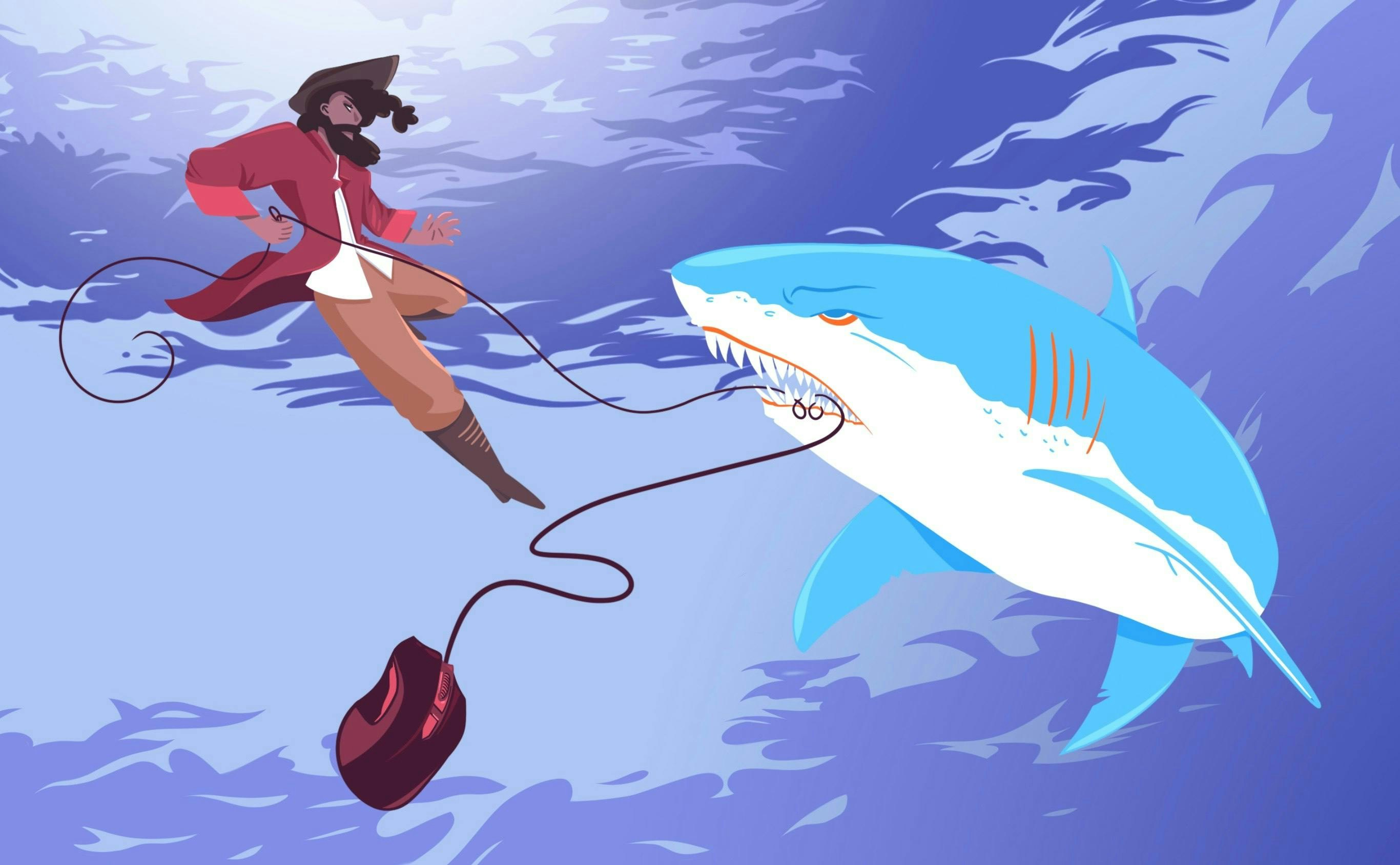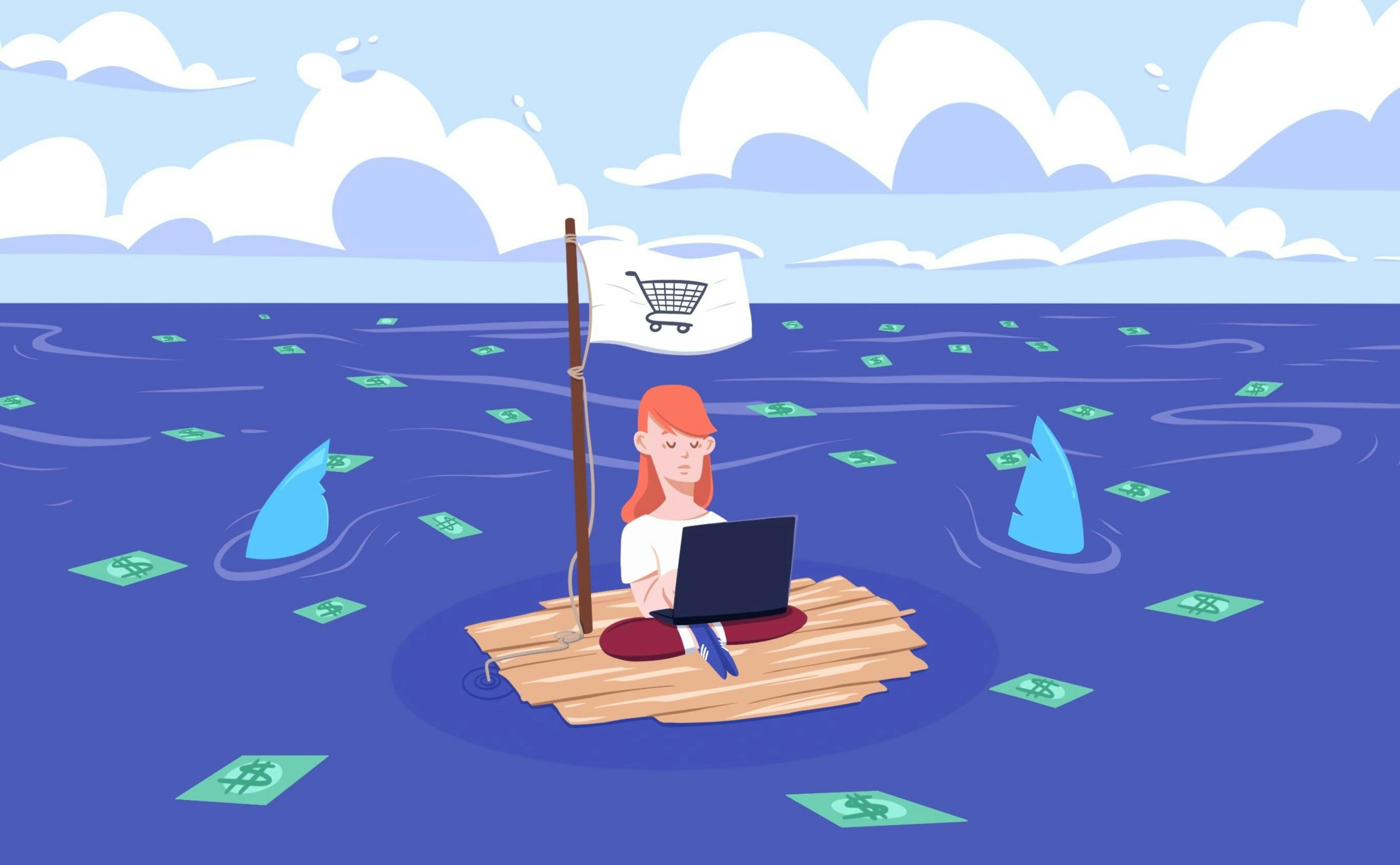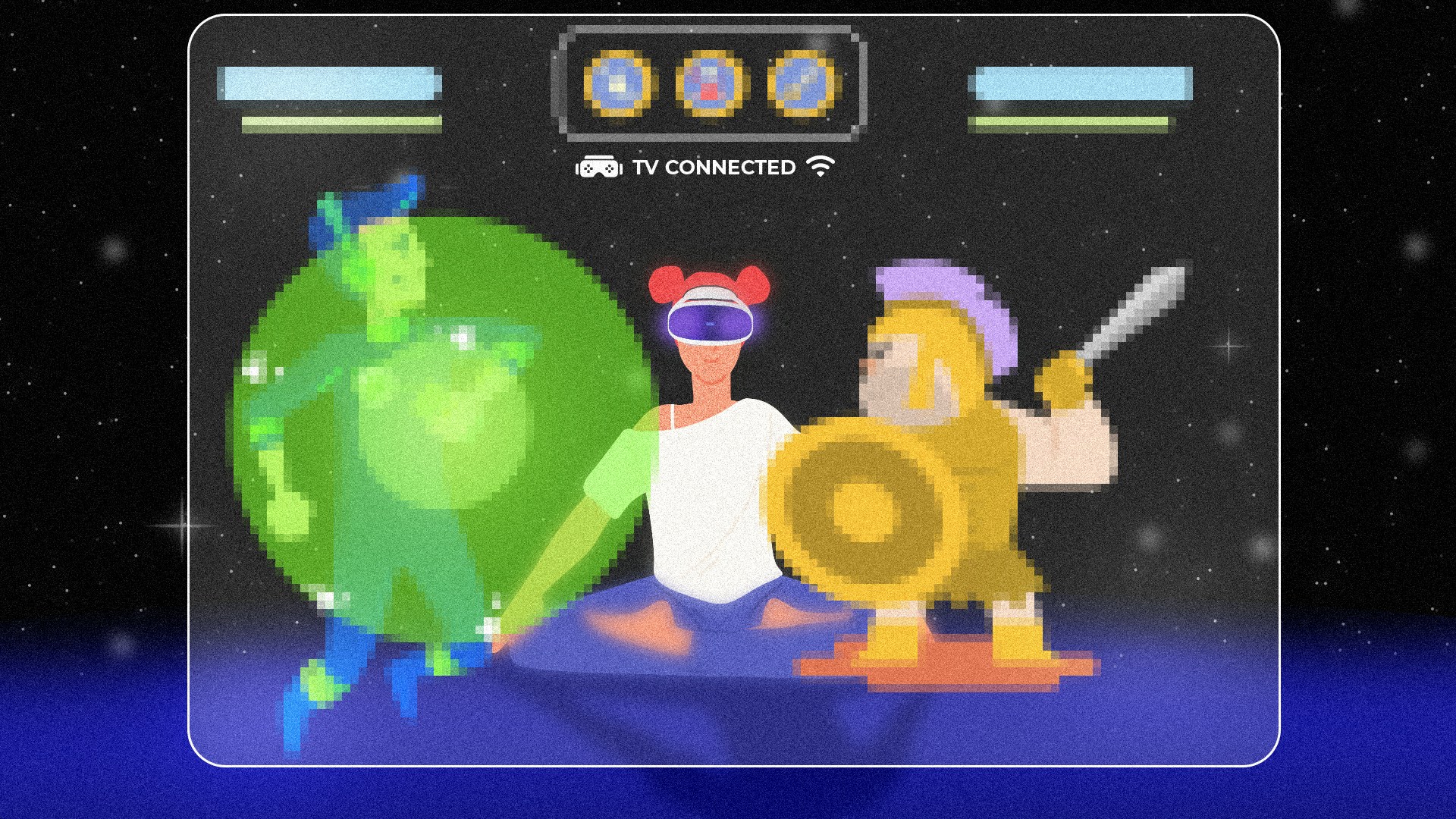The Sharks Versus the Pirates: Grey Markets in Gaming

For a video game publisher, the most important part of a release cycle is the first two weeks. Demand is high, especially for anticipated games, and can generate up to 80 percent of total sales. Illegal downloads and piracy have a major impact on the bottom line: In one survey of piracy around a new game, security firm Irdeto counted 355,664 downloads in the first two weeks alone—a potential loss of over $21 million for the publisher.
Piracy—downloading “cracked” game files via torrent sites, or accessing games through fraudulent game keys—is a dark side of video game economics. It most often hurts independent developers, who rely on legitimate purchases to fund future projects.
Which is why the gaming community was shocked to hear Mike Rose, an indie game developer at No More Robots, tell followers to directly pirate his games instead of acquiring grey-market game keys on unauthorised websites—specifically, a controversial marketplace called G2A.
“Please, if you’re going to buy a game from G2A, just pirate it instead,” he wrote in a July 2019 tweet. “Genuinely, devs don’t see a penny either way, so we’d much rather G2A didn’t see any money either.”
This message was retweeted by other indie creators, including Rami Ismail of Vlambeer, who added, “if you can’t afford or don’t want to buy our games full price, please pirate them rather than buying them from a key reseller. These sites cost us so much potential dev time in customer service, investigating fake key requests, figuring out credit chargebacks and more.”
The idea of an indie developer advocating for direct piracy might seem counterintuitive, but it reflects the increased economic complexity of a thriving global virtual goods marketplace. Last year, the global video games market generated nearly $150 billion, with growth of 7.2 percent year-over-year. (As a reference point, global movie production and distribution industries reported revenues of $136 billion.)
Video gaming has become a booming business. And where there is a buck to be made, grey markets—transactional spaces that walk the line between legal and illegal—are never far behind.
There are many reasons one might use a grey marketplace. Many games are sold in bundles, for example, so people end up with games they either already own or have no interest in playing. Grey markets let you sell unused and unwanted game keys to make a small profit. And video game pricing varies by geographic region, with some markets (Eastern Europe) accessing games at a lower price point than others (North America/Western Europe). Selling across geographic regions can help the buyer save money while still enabling the seller to turn a profit.
Two other factors drive the use of these marketplaces. First, a lack of legal alternatives for the authorised peer-to-peer selling of game keys (and, by extension, other virtual gaming goods). Unlike the easy resale of physical games, virtual goods are limited by strictly regulated white markets. Secondly, price is seen as a major barrier to participating in legal marketplaces, as grey markets often offer pricing that is 30-40 percent less than the suggested retail value.
As a user on the NVIDIA gaming forum, who frequently uses G2A, explained, “I simply can’t pay full games at their current prices. It took me ages to save for my current games. I simply have to get them in other ways if I want to play at all.”
Of course, there are also other behavioural motivations, including the lack of availability of a game in a geographic region because it has not been translated. As in piracy, so in grey markets: Their use often reflects a hole in the sanctioned marketplace.
So let's take a closer look at unauthorised game key sellers, specifically the platform G2A, and the contentious relationship it has with the gaming community.
G2A: A GREY MARKET FACILITATING BLACK MARKET BEHAVIOURS
Founded in Poland in 2010 by Bartosz Skwarckek, the company is currently headquartered in Hong Kong and has over 700 employees and 16 million users. G2A defines itself as a digital marketplace that specialises in reselling game keys, and other virtual gaming goods (VGGs), without direct authorisation from the game publisher. Basically, it acts as a broker between individuals who want to purchase and sell game keys for Steam, Origin, and Xbox, taking a transaction fee ranging from 10-30 percent from every sale.
If VGG markets represent online destinations within a specific video game universe, unauthorised key sellers are digital traffickers, giving people unauthorised access to these online worlds. And while the act of selling an unwanted game key is not illegal (we’ll dive into the legalities below) using these platforms come with inherent risks.
G2A transactions are primarily “blind purchases,” as the buyer has no opportunity to test the key or verify it before making payment. Unlike authorised resellers that verify and source the keys themselves, G2A has no idea where keys are coming from, meaning a purchased key could turn out to be invalid.
Purchasing games from different geographic regions requires bypassing the publisher’s regional lock, often through use of a VPN. This behaviour violates user agreements on platforms like Steam (the world’s leading digital entertainment distribution platform) and, if caught, could result in a user being banned from the service completely.
And even if grey market-purchased keys initially work, keys flagged as suspicious by the publisher could be revoked retroactively, meaning at any point after the purchase (even months later), a user could log on and find their access gone. Some developers, like Devolver Digital, went so far as to say they will revoke any key purchased through grey markets, claiming that transactions are “not legitimate, not guaranteed and not supported.” They added that they are actively “cancelling those keys.”

On a pirate flag, a skull's teeth tightly grip a golden key.
Many transactions that take place on grey markets are harmless. Despite existing outside the authorised publisher ecosystem, the intent to honestly own a digital product remains a major motivator for users. It gets complicated when these transactions are used deliberately to then exploit them, an accusation made against G2A multiple times since its inception.
G2A has been described as a grey market that facilitates black market behaviours, with one tech journalist writing, “they’re an extremely shady middle-man for vendors who sell game keys that are a mix of fake, stolen, out-of-market, or bought with stolen credit cards.”
But the company insists its keys are legitimately sourced, stating, “all game codes/keys are picked up through major distributors, from their original retail boxes, and scanned up into our database.” This claim was disputed by several indie developers, who traced game keys sold through G2A to more nefarious practices, resulting in the combative relationship between the digital store-front and the rest of the industry.
In 2014, game developer Rebellion announced that over seven thousand game keys for its game Sniper Elite 3 were stolen and sold to the public through G2A. In response, Valve revoked these keys, and players who thought they’d purchased a legitimate version of the game could no longer access it.
HOW GREY MARKETS HURT EVERYBODY (EXCEPT THE SHARK)
Unlike the use case of a consumer selling the unwanted game key of a game legitimately received in a bundle, indie developers argue that G2A enables bad actors to sell keys that are fraudulently acquired. The most damaging example is when a vendor (who is not vetted or checked by G2A) uses stolen credit cards to purchase game keys, then sells them to users. Eventually, those purchases are flagged by the credit card holder, and the credit card company not only refunds the money, but charges the retailer of the product’s origin a chargeback fee.
In the case of a revoked key, the G2A seller has already pocketed the profit, and G2A has taken its commission. But the unsuspecting customer is out of luck, and the indie developer must pay a chargeback fee.
This is what happened to video game developer Unknown Worlds Entertainment with the game Natural Selection 2. In 2013, it deactivated 1,341 keys that were purchased through stolen credits cards, where the cardholders also initiated a charge-back.
“This means we never received payment for the game,” Unknown Worlds explained in a blog post. “In fact, we were charged a fee by the card issuer for the charge-back. For these 1,341 keys, these fees totalled around $30,000.”
These costs can be devastating for small game creators, as was the case with developer Tiny Build, forced to close its online store due to high chargeback penalties. In a post outlining its financial losses, the company tracked the sale of over 26,000 games on G2A, resulting in over $450,000 of revenues that the company never saw.
Lesek Lisowski, head of Wastelands Interactive, posted his experience with people trying to solicit free game keys by pretending to be journalists, influencers, or content creators. After the launch of his game Worlds of Magic, he discovered that many keys he had provided for outreach and PR purposes ended up on G2A.
“As it turned out, roughly 70 percent of the keys we had given out were taken under false pretences, or to use another term stolen,” he wrote. “I feel that a game developer’s job is as hard as any other, and I’m absolutely sure no one has the right to steal from us. It doesn’t matter how naïve we are, we shouldn’t be taken advantage of.”
While the technique of impersonating an influencer might seem “low-tech,” it's become a powerful scamming tool through the use of bots and tracker apps. In 2018, Deimos Games, the creators of Helium Rain, posted a thread showing how a bot, embedded within game key requests from influencers, could automate the process of sending hundreds of emails... impersonating multiple legitimate influencers at scale.
“A single scammer is impersonating multiple public figures, requesting review keys of every Steam game, over and over,” one of the developers tweeted. Unsurprisingly, after sending out a game key to one of these accounts to test this theory, they found that key uploaded within hours to G2A.
The other challenge is that tracking, revoking, and investigating fraudulent keys is a labor- and time-intensive process. “A lot of people have been asking about revoking keys,” TinyBuild wrote.
“It seems like an easy no brainer solution, simply disable the keys that leaked or are being sold illegally. The problem with this is a bit more complex than you might think. You have some keys which are legit from bundles, others from a bunch of fraudulent credit cards, and random keys scavenged from giveaways. These would be from at least 3 different batches. How do we track which one to disable? Now imagine when we have hundreds of these batches. Large corporations tackle this by having a ton of people working on tracking smaller batches, but we want to stay small & nimble. This means automating as much as possible. And even if we were to spend a ton of time on micromanaging this, it wouldn't solve the overall problem.”
LEGALITIES OF VGG GREY MARKETS: PHYSICAL VS. DIGITAL BOUNDARIES
Two interesting legal developments are impacting the economics of virtual gaming goods: the classification of digital goods themselves, and the application of physical borders within a digital marketplace.
1. THE CLASSIFICATION OF DIGITAL GOODS
The “first-sale doctrine,” which eliminates the copyholder’s control of resale after the first purchase, has traditionally only been applied to physical goods such as books, CDs, and physical video game disks. This means that consumers who purchase an authorised legitimate physical copy of a video game have the right to resell that game to a friend, or at a garage sale, whenever they want. The first-sale doctrine generally excluded digital goods that operated on a license, which can't be transferred beyond the original purchaser.
As more games became only-digital, the lack of ease of reselling “used” or “unwanted” digital games explains the rise of grey market platforms, where consumers want basic physical ownership rights extended to virtual assets as well.
Big changes are on the horizon due to a new ruling by the district court of Paris, which recently ruled in favour of a consumer rights organisation in a lawsuit against Valve (owner of Steam), giving gamers the right to sell digital games. The court ruled that despite the licenses and subscriptions, Valve’s true product was “dematerialized games” and consumers have the right to resell their digital downloads the same way that they can sell physical ones.
Valve is expected to appeal this decision. This precedent will change not only the purchase and sale of video games, but all digitally downloaded products, including movies, music, and most interestingly, virtual gaming goods (sales or exchanges of which are currently prohibited by game subscription/license user agreements). It could force new white market opportunities that would remove the risks associated with unauthorised vendors.
This is an evolving legal space, but calls into question how to best protect digital creators. Unlike a used book or CD, a digital game won’t wear down, and can be sold infinitely through secondary markets, which could negatively impact independent producers' ability to pay living wages, leading to a long-term decline in market content diversity.
Analysts predict technological responses from game publishers, including setting a limit on the amount of times a product can be digitally transferred, or a digital transfer tax, but these remain early-stage proposals. Another possible response is the shift towards a streaming/subscription gaming model that removes the need to “own” games in the first place, similar to what happened with Netflix and Spotify. This would remove the need for keys at all, a move that would also impact the transactions around owning/purchasing VGGs.
In May 2019, Ubisoft announced it would move away from game keys and towards a verification system, directly tied to user accounts. Epic Games is also working on what they are calling “non-key based purchase fulfillment” for the Epic Store.
2. OFFLINE BOUNDARIES WITHIN ONLINE MARKETS
The second issue is the use of geo-locking digital products, either by restricting their sale or applying different price points for various regions.
In 2018, the European Commission released a statement of objection against Valve and five major game publishers, stating that geographic restrictions on the sale of PC video games are violations of anti-trust rules, and go against the EU’s vision of creating a single digital market, with regulations that came into effect in 2018 to allow Europeans to shop online without borders, and to end the practice of “unjustified geo-blocking.”
These new policies show that, despite the unregulated global nature of VGGs, governments are paying attention to this growing marketplace. New regulations will force industry players to adjust existing business practices, and in some cases force them to change their pricing models.
SO, BACK TO PIRACY
This leads back to the option originally proposed by Mike Rose: piracy. Despite being universally panned within global multimedia markets (film, music, and television), the arguments against piracy are more nuanced when it comes to video games. Some say that users who pirate games are unlikely to purchase a legal copy in the first place, while others argue about the long-term normalising of pricing that doesn’t reflect the time, effort, and money required to produce games.
Finding statistics on the cost and rate of video game piracy has been challenging, since games are often grouped with other forms of multimedia. A 2019 report by the US Chamber of Commerce estimated that online media piracy costs the US economy almost $30 billion a year, with more than 500.000 industry job losses. This results in an estimated loss of $47,5 and $115,3 billion in American GDP. A 2012 study from the Entertainment Software Association of Canada estimated that pirated computer video games cost US and Canadian markets up to $3,5 billion (Joseph de Weck and Marie Mawad in “Free Online Games Sink Pirates to Unlock Emerging-Market Growth,” Bloomberg BusinessWeek, August 27, 2012).
According to a 2016 PC Gamer survey of over 50.000 respondents globally, 35,8 percent pirated a PC game within that time frame. Interestingly, when respondents were asked whether they thought it was wrong to pirate games, 34,8 percent said yes; 21,6 percent said yes, but they do it anyway; and nearly 23 percent said it depended on the game. Nearly 1 in 5 respondents didn’t think pirating games was wrong.
Frankly, the impact of piracy is not so cut and dry. Nearly half of respondents in a 2016 survey reported purchasing a game legally that they previously pirated, with 11,4 percent saying they never have. In response to a Quora question on whether piracy is killing the video game industry, user Shery deWinter echoed this point: “I used to pirate pretty much everything. Why? Because I couldn’t afford games,” she wrote. “It’s been years though. It’s been over a decade since I last pirated a game. But more then that—every single game that I had ever pirated and played for more than a couple of hours I actually ended up purchasing. I’m not going to argue how much piracy takes away from the industry. But for people like me, piracy was one of the reasons I could become a gamer in the first place. And I paid all that money back and then some.”
In a 2017 European Commission report entitled “Estimating Displacement Rates of Copyrighted Content in the EU,” 30.000 EU consumers were surveyed about their downloading habits, with surprising results. The study approximated that for every 100 games illegally downloaded, players would legally acquire 24 more games than they would without piracy platforms. While the report also acknowledges several caveats in their methodology, the most interesting finding was that piracy has a different effect on games compared to other digital media, such as books or movies (pdf).
A similar result was reported in a 2011 academic paper, entitled “How Series is Piracy in the Videogame Industry?” by Fukugawa Nobuya, who surveyed video game console users and found that, while 40 percent of respondents knew how to download illegal pirated content, only around five percent actually did. Further, the paper stated that “there was no significant negative relationship between downloading pirated versions and purchasing genuine versions.” (Note, though, that this study relied on a questionnaire about topics that some people might have chosen not to respond to truthfully, as it required disclosing illegal activities.)
For some publishers, releasing a game on torrent sites could be a good way to get players to try a game in an oversaturated market. This was the strategy used by the creator of Danger Gazers, a game released in 2020 that was struggling to attain market exposure.
Shota Babokhizdze, the developer, uploaded a stripped version of the game to The Pirate Bay, one of the most popular digital piracy sites in the world. The game included everything, except features you would get from purchasing it via Steam, such as collaborative play and connecting with friends. The result? An increase in sales by nearly 400 percent. One Steam reviewer wrote, “Dev shared a torrent of the game so those who can’t buy the game for XY reason can play it. Instant purchase for me. Happy to support the studio.”
The downside of piracy is the increased risk of not knowing exactly what you’re downloading. In 2013, anti-virus company AVG warned that 90 percent of available pirated games contain some form of malware or malicious code, stating, “The prevalence of cracked patches, cheats, and more indicates that this is a highly organised, crime based, initiative.”
A 2014 incident found tens of thousands of gamers who downloaded a copy of the game Watch Dogs also unknowingly installed a Bitcoin mining bot that siphoned up to 25 percent of a gamer’s CPU. (PC gamers are a particularly good demographic for hacking, as they tend to hold an outdated cultural belief that anti-virus software slows their gaming experiences, leaving them vulnerable to attack.)
As mentioned earlier, installing and using a pirated or “cracked” game could result in bans from gaming networks. In 2019, security lab Kaspersky reported an increase in ransomware hidden within pirated copies of popular games. Interestingly, the web has made it easier for wannabe hackers to access fully packaged malicious code, lowering the technical skillset once required for embedding malware into games.

A customer afloat on a sea of money and sharks.
WHERE DOES THIS LEAVE US?
Grey markets serve an unmet need; the activities of game key resellers act as a macrocosm for VGG transactions that happen on a micro-basis, helping analysts better understand how to identify areas of opportunities within this emerging digital space.
On the other hand, they are ripe for exploitation by bad actors, a problem made worse by the fact that people often use grey markets because they consider it a more supportive alternative to piracy. However, the industry is quickly adapting and moving towards business models that render the current iteration obsolete. And their existence as an adjacent-to-white-market ecosystem, with all its unintended consequences, had a bigger impact than anticipated in forcing market-wide changes and new policies.
Lastly, despite their murky existence online, they can be effectively limited and impacted by real-world geopolitics, such as EU single digital market laws, and the evolving legal precedent against first-sale doctrine. This is in itself an important lesson in understanding how to better cultivate our online spaces, especially as its consequences bleed ever more steadily into offline reality.
25 Nov 2020
-
Rahaf Harfoush
Illustrations by Macha Pulcini
DATA-DRIVEN TECH & SOCIAL TRENDS. DISCOVERED WEEKLY. DELIVERED TO YOUR INBOX.
02/03
Related Insights
03/03
L’Atelier is a data intelligence company based in Paris.
We use advanced machine learning and generative AI to identify emerging technologies and analyse their impact on countries, companies, and capital.


